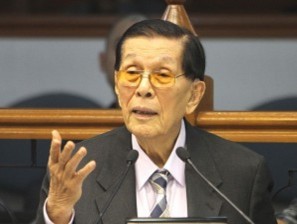
Senate President Juan Ponce Enrile, the presiding officer in the impeachment trial, said that whoever was behind the leakage of Chief Justice Renato Corona’s bank accounts could be the subject of a separate criminal complaint. INQUIRER file photo
The Senate on Wednesday deferred the approval of proposed amendments to the Anti-Money Laundering Act (Amla) after some lawmakers questioned the predicates under which the Anti-Money Laundering Council (Amlac) could share information with internal revenue investigators.
Although the amendments are needed to keep the Philippines off an international financial blacklist, Senate President Juan Ponce Enrile and Senator Joker Arroyo demanded that the Amla council and the Bureau of Internal Revenue first explain why they apparently use tax evasion “as an excuse to scrutinize the bank accounts of suspected money launderers.”
Through questioning, Enrile was able to elicit an admission from Senator Teofisto Guingona III that Amlac and the BIR “conduct joint efforts” to pin down suspected tax evaders.
Predicate crime
Enrile questioned whether tax evasion was a predicate crime for money laundering that would allow Amlac to participate in such investigations.
Enrile took note of a memorandum of agreement (MOA) between Amlac and the BIR “to look into bank accounts of taxpayers.”
“Is tax evasion a predicate crime for money laundering? Why is there a need for a MOA?” the Senate President asked.
He warned that only Congress, through a legislative act, could include tax evasion as a predicate crime that would warrant investigation should the suspicion of money laundering arise.
Congress mandate
“It’s a mandate of Congress, not of bureaucrats,” he noted.
Guingona clarified that the MOA only allows the two agencies to “share financial data.”
The exchange prompted Arroyo to suggest that the Senate scrutinize the proposed amendments “more carefully.”
“The BIR is the agency that collects taxes, audits and conducts investigations. But the Amla does not say that tax evasion is a predicate crime,” Arroyo noted.
“If the BIR prosecutes individuals for tax evasion and is empowered to obtain any information on business and income of persons subject to investigation with cooperation from Amlac, we have to go over this more carefully,” he warned.
Enrile suggested that BIR commissioner Kim Henares and Amlac executive director Vicente Aquino first clarify these issues with the Senate before it approves the amendments.
Pressure on Senate
Pressure for the Senate to approve amendments to the Amla law emanates from a demand from the international Financial Action Task Force (FATF) for country support in the effort to track down transnational terrorist financing.
These include an expansion of country lists of predicate crimes for money laundering, a Terrorist Financing Suppression bill and the inclusion of an ex parte provision in the appropriate laws allowing investigators to scrutinize bank deposits without informing a suspected launderer.
The FATF will hold a plenary session in June. The international body is threatening to include the Philippines in its blacklist should President Benigno Aquino III fail to sign the amendments into law.
At present, the Philippines is in the FATF’s “dark grey list” after its failure to enact the amendments last December, Guingona warned.
Also on Wednesday, Enrile challenged Guingona to confirm whether other countries in the FATF’s so-called dark grey list are also being pressured to conform to its demands.
“Are we the only one not compliant?” Enrile asked.
Guingona said other countries being given the opportunity to amend their laws before the FATF plenary in June include Ecuador, Vietnam, Yemen, Algeria, Angola, Antigua, Argentina, Bangladesh, Brunei, Cambodia, Kyrgystan, Morocco, Tajikistan and Trinidad and Tobago.